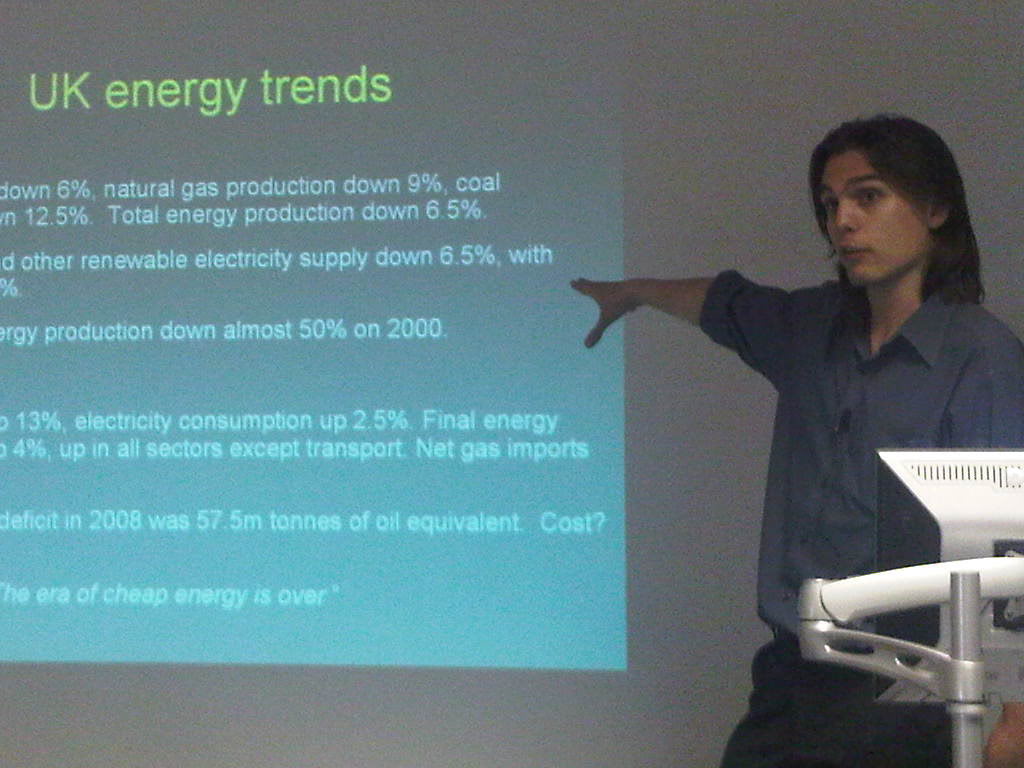
by Shaun Chamberlin | Jul 7, 2010 | All Posts, Peak Oil, TEQs (Tradable Energy Quotas)
The slides and audio are now available from the seminar David Fleming and I gave at the London School of Economics last week.
The topic was "Transition Towns and Tradable Energy Quotas: Frameworks to support a diversity of small-scale solutions to the large-scale problems of peak oil and climate change".
Note that the slides are mis-numbered on the LSE site, so my opening section is Audio Part 1 (which begins with introductions from those present) and Slides Part 2, and David's is Audio Part 2 and Slides Part 1!
My section was a half-hour run-through of climate change, peak energy, finance and the Transition response, much of which will be familiar to regular readers, but delivered to an interesting (and interested) new audience.

by Shaun Chamberlin | Jun 9, 2010 | All Posts, Climate Change, Cultural stories, Favourite posts, Peak Oil, TEQs (Tradable Energy Quotas), The Transition Timeline, Transition Movement
https://www.darkoptimism.org/wp-content/uploads/2020/10/10-03-26-Radio-EcoShock_Chamberlin_LoFi.mp3 Christopher Fraser of London Transition has kindly transcribed the above popular interview with Canada’s Radio Ecoshock that I posted a couple of months back....
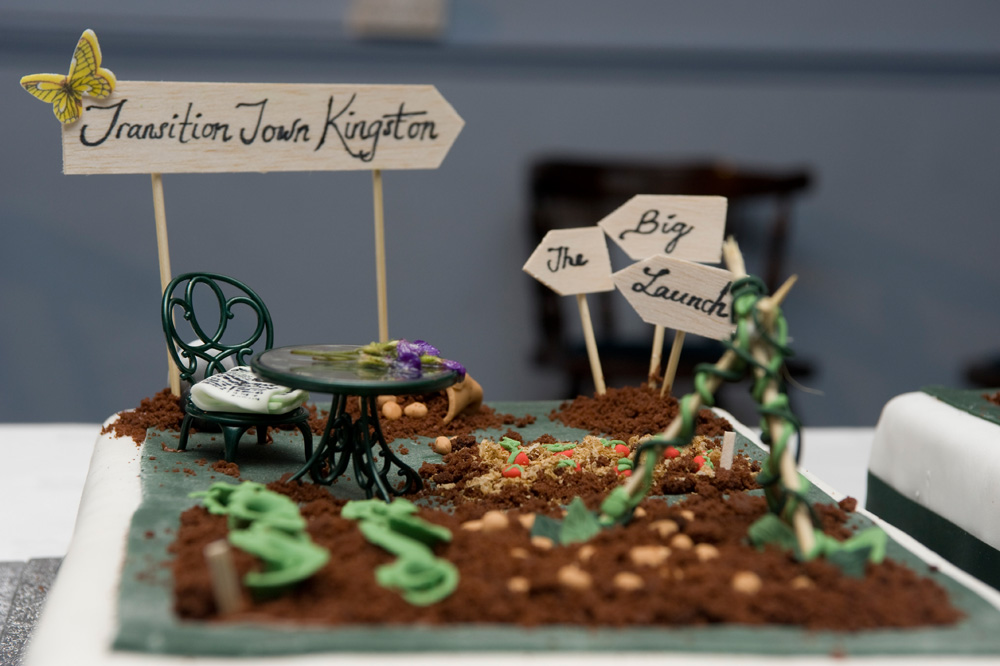
by Shaun Chamberlin | Apr 20, 2010 | All Posts, Favourite posts, Transition Movement
So the big day finally came and went, and glorious it was too. I'm still smiling from the wonderful energy of it all. Pause a moment to take in the brilliance of the TTK cake (TT Kake?) before clicking through to a peek at the many-splendoured event itself, including a chance to see the accomplished and inspired short movie of TTK's story to date that premièred on the night.
The energy levels never dropped after the buzz of the children's hour that kicked the day off, with gleeful kids seeing a real bee hive, making puppets out of plastic bags, writing poetry, getting faces painted etc etc while the parents browsed the stalls of local green businesses and organisations...
 Next, local inspiration Robin Hutchinson entertainingly introduced talks from our local MPs (although this close to the election he had to describe them as "Parliamentary candidates who you may remember from their previous jobs"!), our mayor, the head of the Council, me and the ever-entertaining David Fleming, back by popular demand, who hesitated to despoil the cake by doing us the honour of cutting it.
Next, local inspiration Robin Hutchinson entertainingly introduced talks from our local MPs (although this close to the election he had to describe them as "Parliamentary candidates who you may remember from their previous jobs"!), our mayor, the head of the Council, me and the ever-entertaining David Fleming, back by popular demand, who hesitated to despoil the cake by doing us the honour of cutting it.
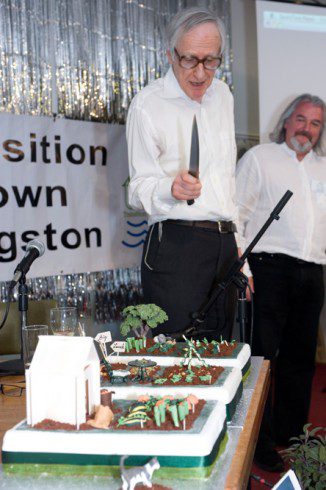 We also received a congratulatory video message from Rob Hopkins before a planned Open Space session, in which we faced the real challenge of getting everyone to stop having passionate, deeply involved conversations long enough so that we could explain to them how wonderfully Open Space could facilitate such conversations.
With Prisca Baron singing to a rapt audience of children and adults alike, DJ Matt providing the soundtrack late into the night and Toni Izard and family laying on an amazing spread of food and refreshments, it felt like a real triumph of community spirit, with smiles on the faces of old stalwarts and total newcomers alike.
We also received a congratulatory video message from Rob Hopkins before a planned Open Space session, in which we faced the real challenge of getting everyone to stop having passionate, deeply involved conversations long enough so that we could explain to them how wonderfully Open Space could facilitate such conversations.
With Prisca Baron singing to a rapt audience of children and adults alike, DJ Matt providing the soundtrack late into the night and Toni Izard and family laying on an amazing spread of food and refreshments, it felt like a real triumph of community spirit, with smiles on the faces of old stalwarts and total newcomers alike.
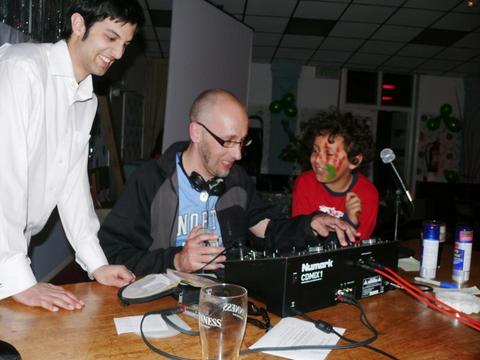 I didn't manage to get a handle on the numbers there (perhaps 250??), but it was great to see so many unfamiliar faces mingling happily, and contributing to the Kingston Timeline that we pinned to the wall (see some of the ideas it produced here).
Even the venue itself felt like a new ally, as almost everyone attending had never set foot in Kingston Working Men's Club before, despite its location tucked away right in the heart of Kingston. A great many more people know it's there now, and hopefully a few lasting connections have been forged.
For me personally, the two particular highlights in a night of delights were the deliciously brilliant (and brilliantly delicious!) cake - or actually three cakes - and the TTK movie. Credit for the first, and for the photos featured here, goes to our talented trio Libby, Jonny and Maria, AKA Caking Agent.
I didn't manage to get a handle on the numbers there (perhaps 250??), but it was great to see so many unfamiliar faces mingling happily, and contributing to the Kingston Timeline that we pinned to the wall (see some of the ideas it produced here).
Even the venue itself felt like a new ally, as almost everyone attending had never set foot in Kingston Working Men's Club before, despite its location tucked away right in the heart of Kingston. A great many more people know it's there now, and hopefully a few lasting connections have been forged.
For me personally, the two particular highlights in a night of delights were the deliciously brilliant (and brilliantly delicious!) cake - or actually three cakes - and the TTK movie. Credit for the first, and for the photos featured here, goes to our talented trio Libby, Jonny and Maria, AKA Caking Agent.
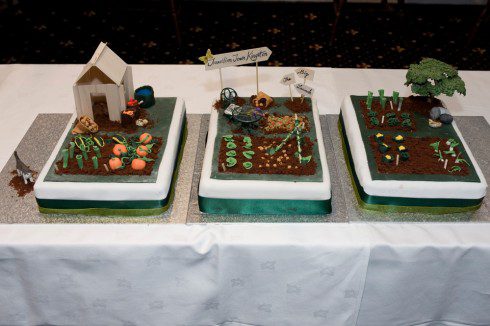 The second was the work of Elise Toogood and Nick Barron of Tenth Egg, and you can see it in all its glory below. As both cake and film were only finished in the early hours of the morning of the event, both were genuine surprises even for those of us heavily involved in pulling the event together.
Films at their best have a wonderful way of evoking a sense of overarching narrative, and for me personally it was a delight to feel this as I watched it. Despite knowing all of the projects featured - or perhaps because of that - it was deeply satisfying to see the different threads pulled together into this tapestry.
Many thanks too to those who organised the surprise for the six of us on TTK's Temporary Steering Group, pulling us on stage to present each of us with our very own blueberry bush! It would be impossible to mention everyone who made the event possible, but hopefully they all enjoyed it as much as I did.
I will add more photos below as they come in, including the happy crowds and impressive before and after pics from the decoration efforts on Friday evening.
My apologies if this post is rather excitable - I can only confess that I'm still excited! Just as an Unleashing should, this has reminded me what a marvellous community I live in, and feels like a historic launchpad to a happier, more thrivacious Kingston!
[caption id="attachment_1933" align="alignnone" width="480"]
The second was the work of Elise Toogood and Nick Barron of Tenth Egg, and you can see it in all its glory below. As both cake and film were only finished in the early hours of the morning of the event, both were genuine surprises even for those of us heavily involved in pulling the event together.
Films at their best have a wonderful way of evoking a sense of overarching narrative, and for me personally it was a delight to feel this as I watched it. Despite knowing all of the projects featured - or perhaps because of that - it was deeply satisfying to see the different threads pulled together into this tapestry.
Many thanks too to those who organised the surprise for the six of us on TTK's Temporary Steering Group, pulling us on stage to present each of us with our very own blueberry bush! It would be impossible to mention everyone who made the event possible, but hopefully they all enjoyed it as much as I did.
I will add more photos below as they come in, including the happy crowds and impressive before and after pics from the decoration efforts on Friday evening.
My apologies if this post is rather excitable - I can only confess that I'm still excited! Just as an Unleashing should, this has reminded me what a marvellous community I live in, and feels like a historic launchpad to a happier, more thrivacious Kingston!
[caption id="attachment_1933" align="alignnone" width="480"] picture courtesy of Simone Kay[/caption]
picture courtesy of Simone Kay[/caption]

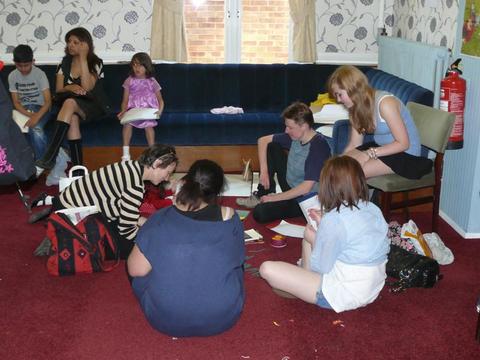 Poetry workshop
Poetry workshop
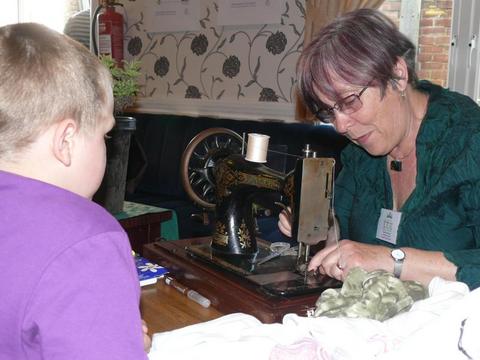
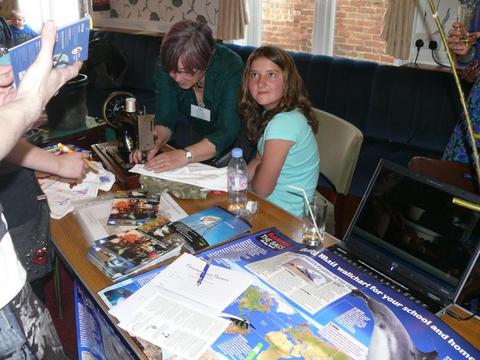 [caption id="attachment_1934" align="aligncenter" width="320"]
[caption id="attachment_1934" align="aligncenter" width="320"]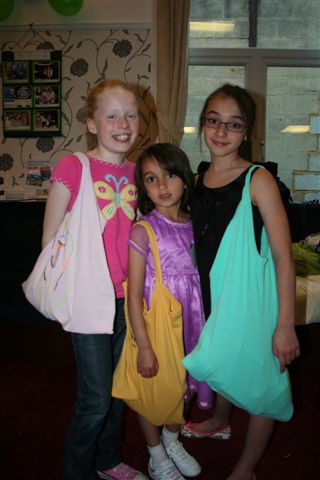 Bags created on the day, picture courtesy of Simone Kay[/caption]
Bags created on the day, picture courtesy of Simone Kay[/caption]
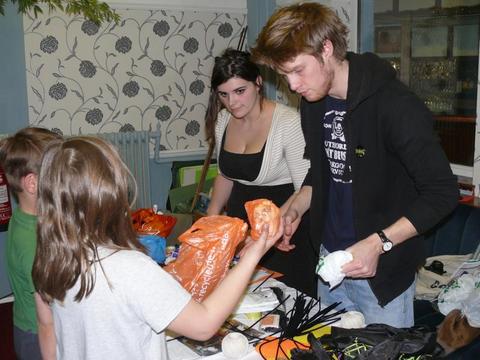 Making puppets from plastic bags
Making puppets from plastic bags
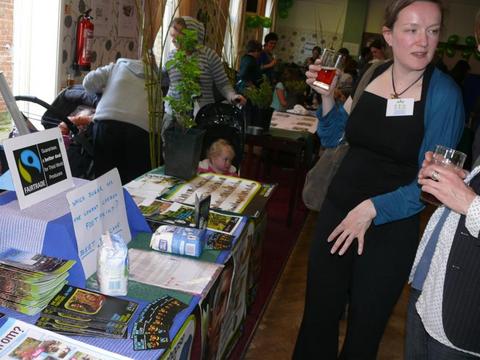
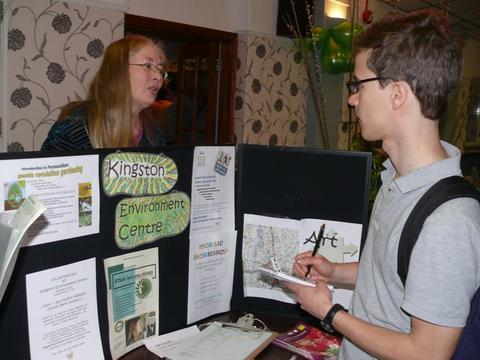
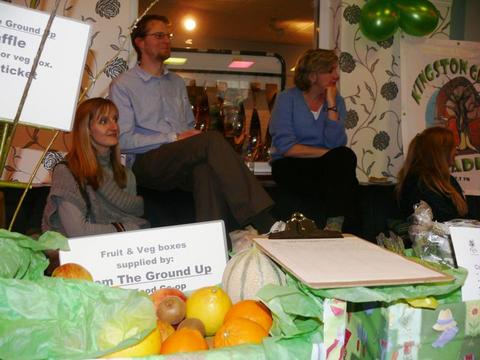
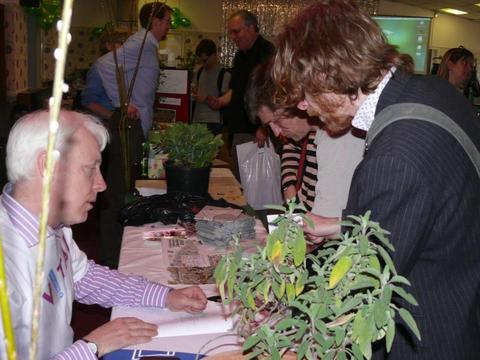
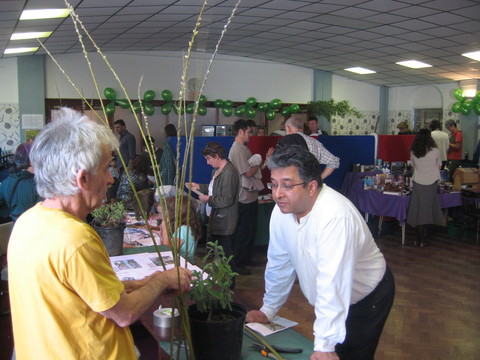
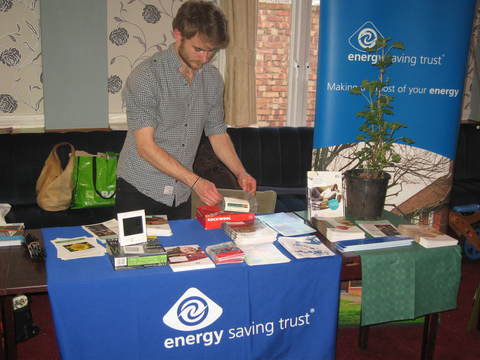
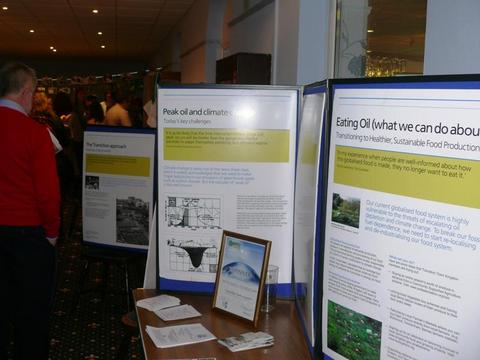 Stalls and info from TTK groups, local businesses and organisations
Stalls and info from TTK groups, local businesses and organisations
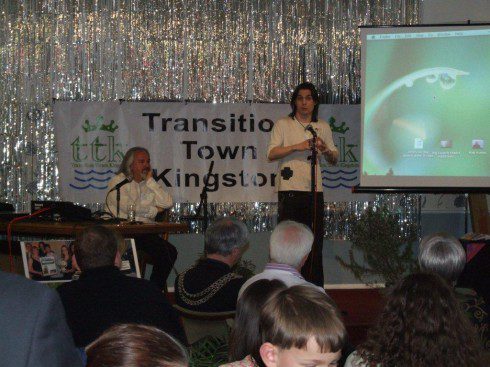
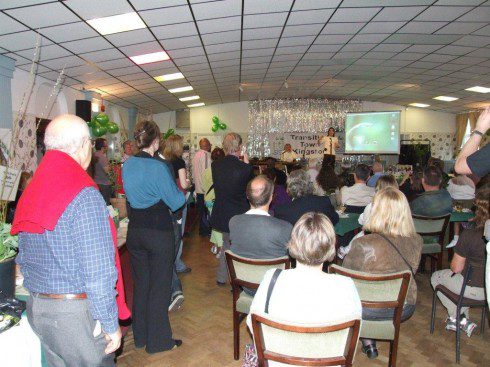 Me speaking about the origins of Transition and TTK
Me speaking about the origins of Transition and TTK
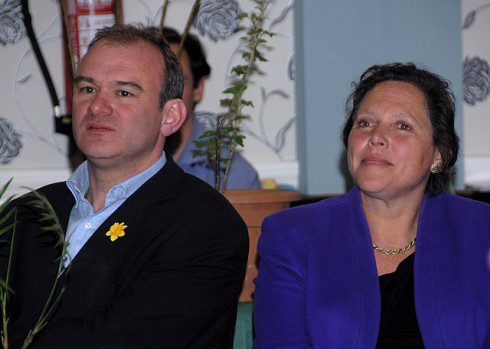 Our local MPs, Ed Davey and Susan Kramer
Our local MPs, Ed Davey and Susan Kramer
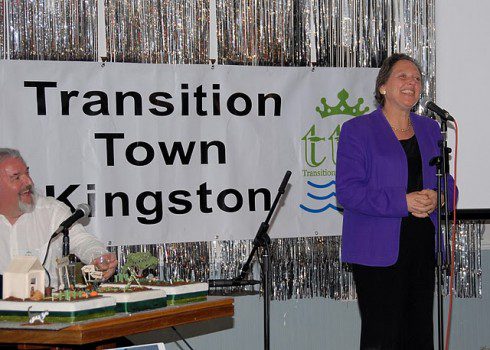
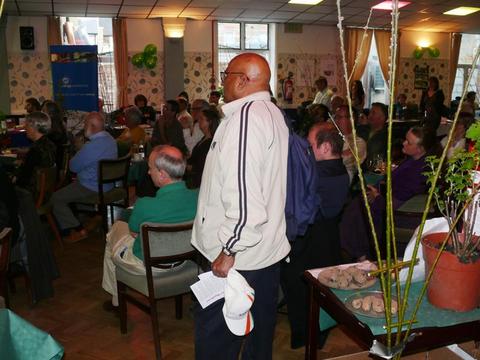
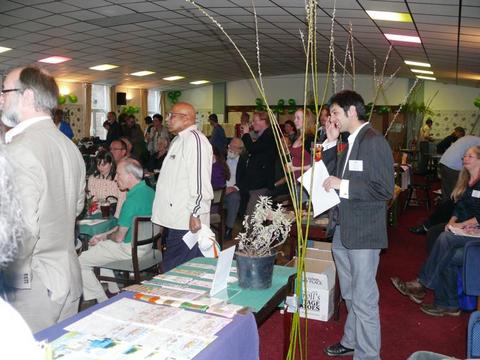
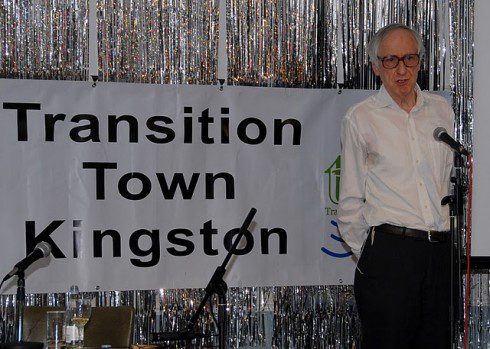 David Fleming speaking
David Fleming speaking
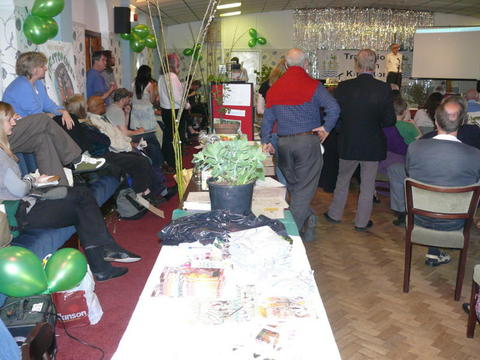
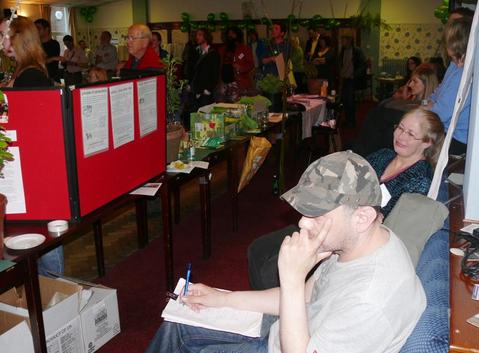
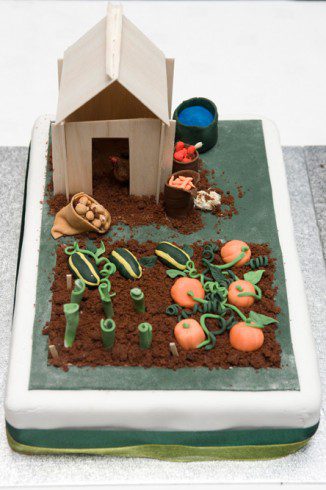
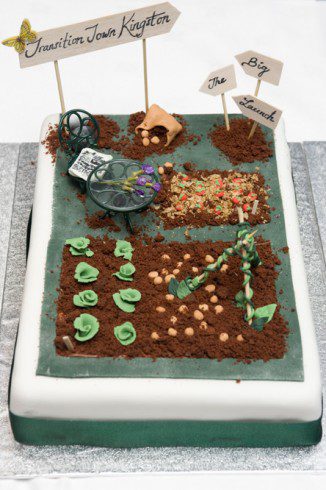
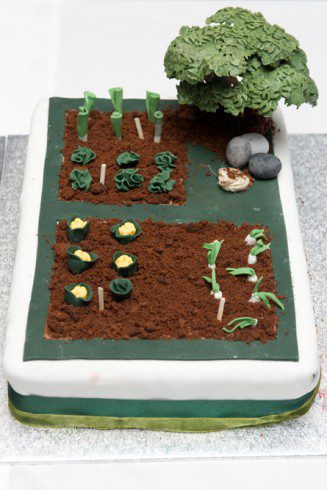 Closeups of the magnificent cake
Closeups of the magnificent cake
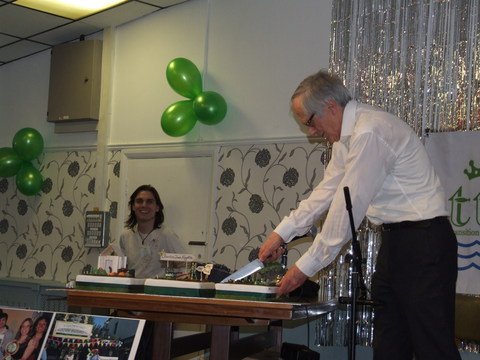 David Fleming does the honours
David Fleming does the honours
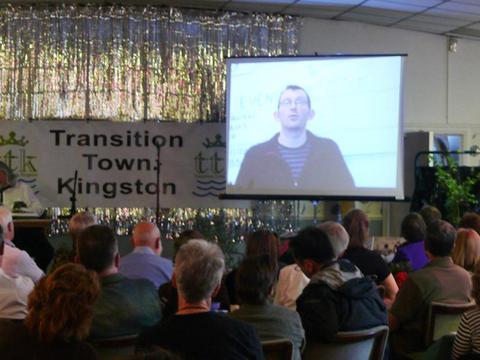 Rob Hopkins' video message
Rob Hopkins' video message
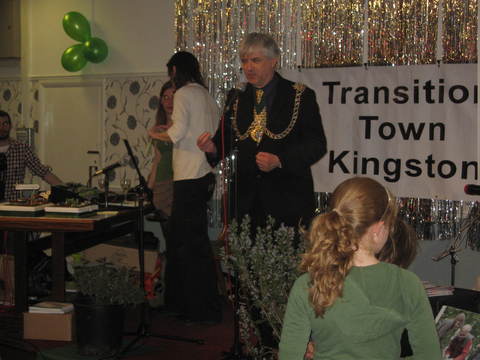 Kingston's Mayor addresses the crowd
Kingston's Mayor addresses the crowd
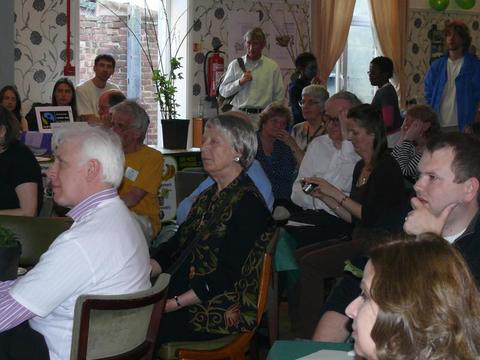
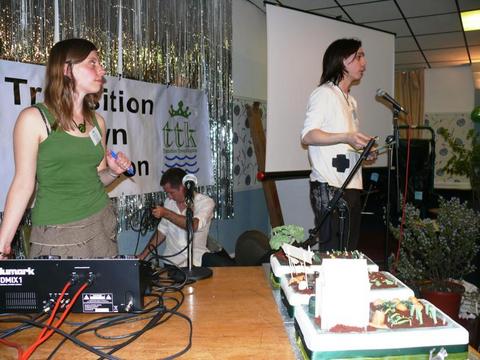 Organising the Open Space, raffle etc.
Organising the Open Space, raffle etc.
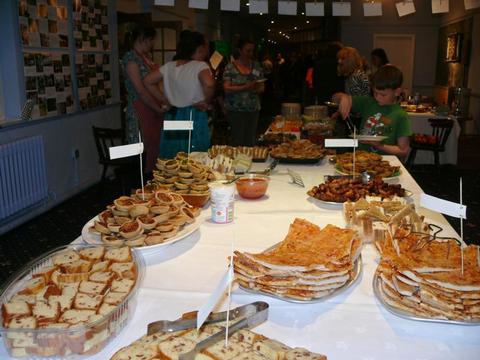
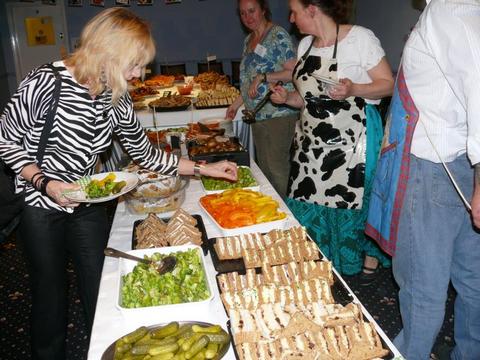 The fantastic spread put on by Toni Izard and family
The fantastic spread put on by Toni Izard and family

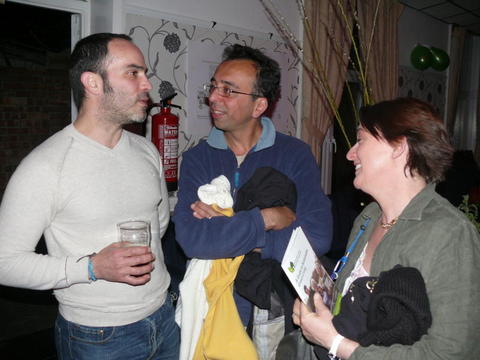
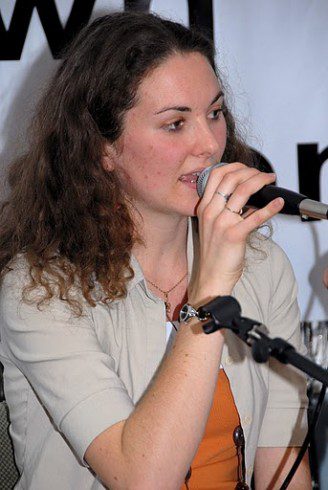 Prisca Baron singing
Prisca Baron singing
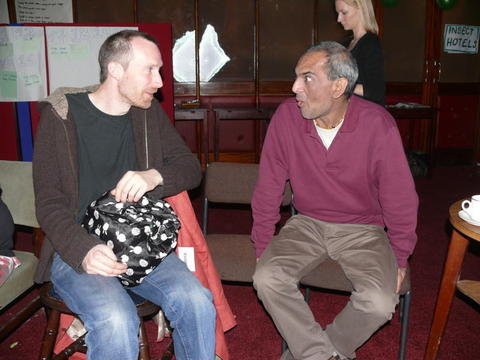
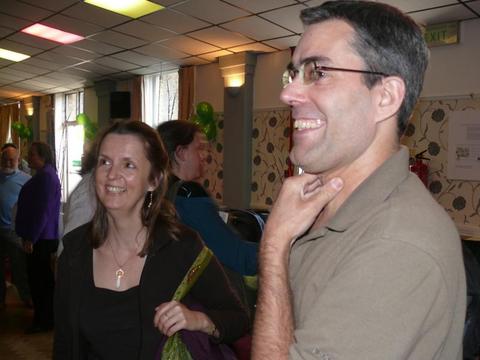 Visitors from other Transition initiatives
Visitors from other Transition initiatives
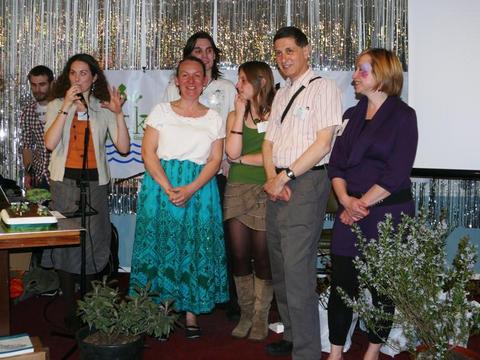
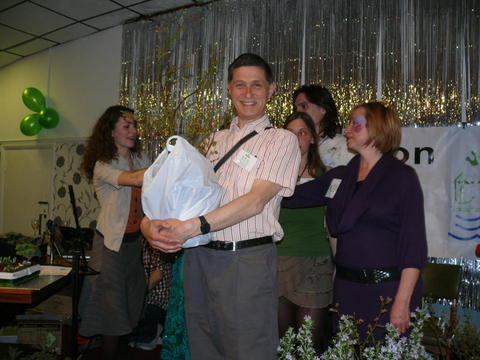 TTK give a gift to the Steering Group - thanks all!
TTK give a gift to the Steering Group - thanks all!
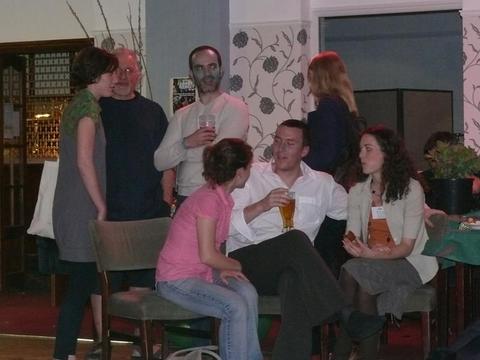
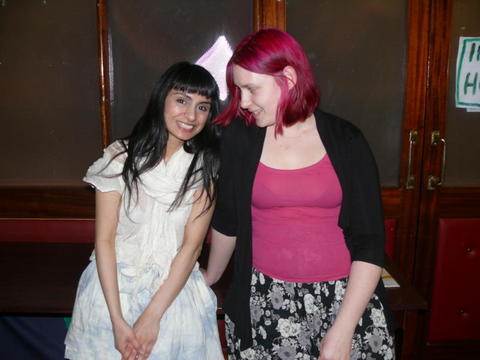 Libby and Maria - two of the cake conjurers!
Libby and Maria - two of the cake conjurers!
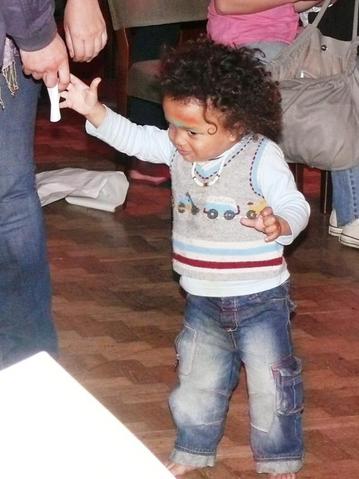
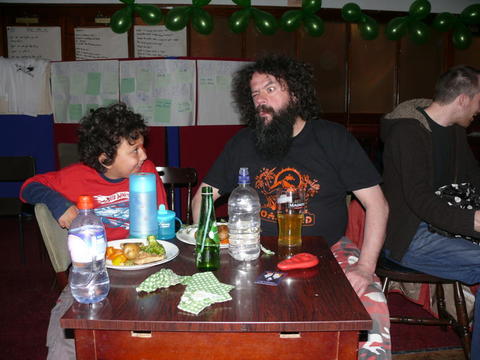
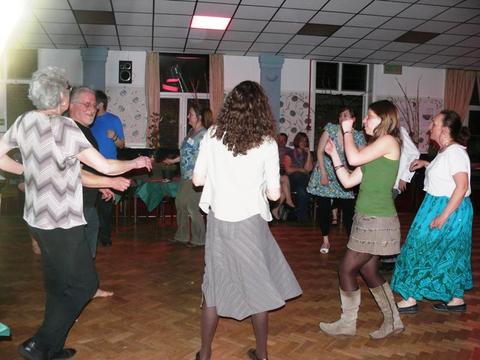 Dancing late into the night
Dancing late into the night
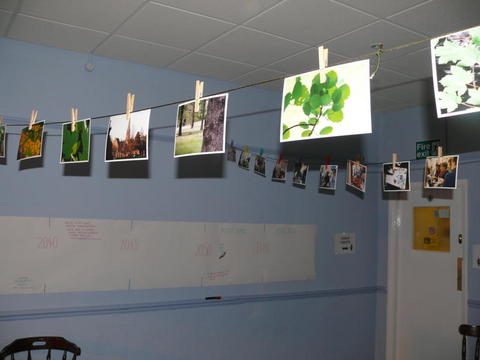
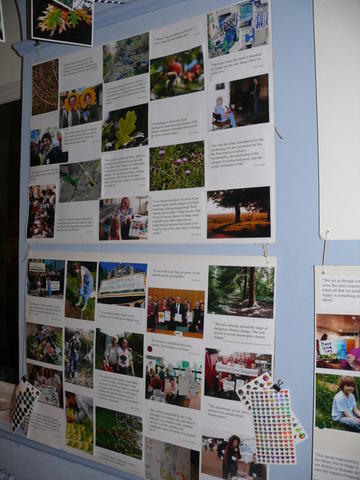 Photos from TTK's history to date, mixed with relevant and inspiring quotes
Photos from TTK's history to date, mixed with relevant and inspiring quotes
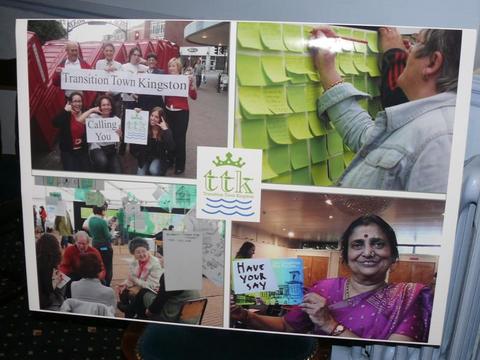
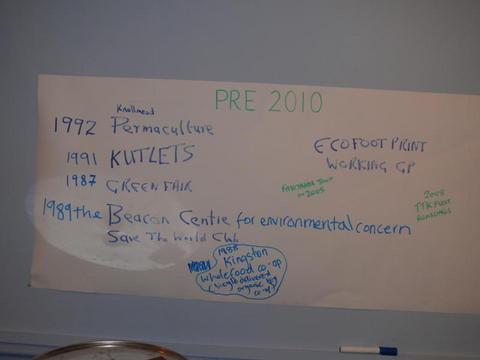
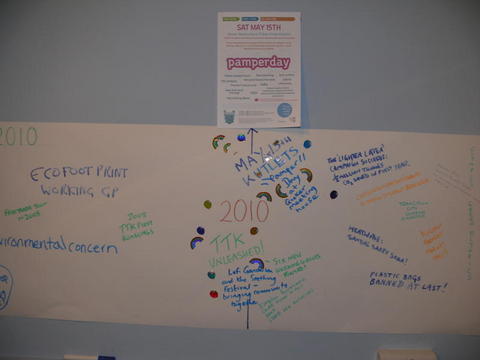
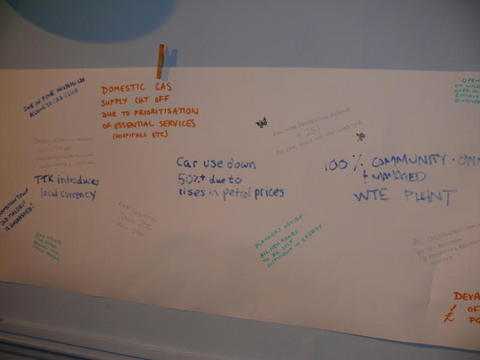
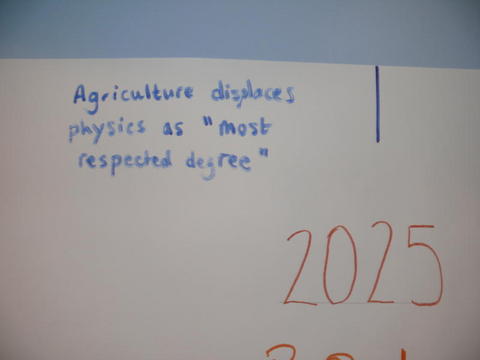
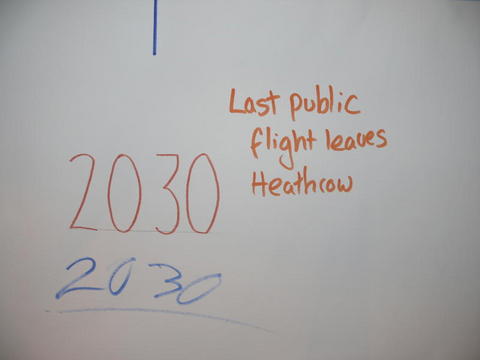
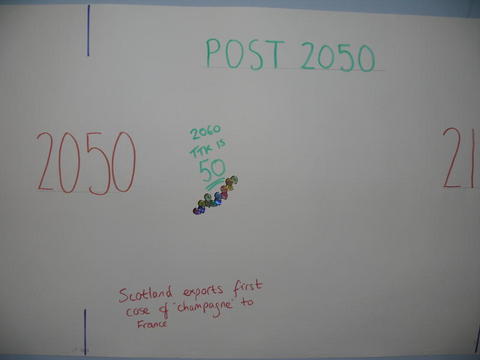 The Kingston timeline, created by Big Launch attendees
The Kingston timeline, created by Big Launch attendees

by Shaun Chamberlin | Mar 28, 2010 | All Posts, Climate Change, Cultural stories, Peak Oil, TEQs (Tradable Energy Quotas), The Transition Timeline, Transition Movement
https://www.darkoptimism.org/wp-content/uploads/2020/10/10-03-26-Radio-EcoShock_Chamberlin_LoFi.mp3 Above is a 24 minute interview I did last week with Canada’s excellent Radio Ecoshock. The full 60 minute show can be heard here. Dark Optimism readers may also be...
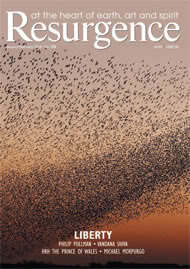
by Shaun Chamberlin | Feb 23, 2010 | All Posts, Cultural stories, Favourite posts, Peak Oil, Philosophy, The Transition Timeline
Below the cut is the text of my latest article for the highly-recommended Resurgence magazine. They asked me to tell the story of my own personal journey thus far, and how I ended up doing what I do. Thanks to Resurgence for permission to reproduce it here (and on my articles page).
---
Applied Philosophy
Don’t ask what the world needs. Ask what makes you come alive, and go do it.
---
For me, there was a definite moment when my environmental awakening began in earnest. I was studying philosophy at the University of York a decade ago when, out of the blue, I received an email from my father alerting me that “a long-term survey of oil and gas resources shows that demand for oil will exceed the maximum possible supply by 2010 and the oil price will sky-rocket”. This was followed by his (enduringly plausible) outline of the likely consequences – economic collapse, mass starvation and war.
I took a deep breath.
My initial reaction, like that of so many in their ‘peak oil moment’, was one of shock, rapidly followed by disbelief. I wondered how there could be near-universal silence on this issue if it truly had such vast implications, and tried to assure myself that ‘they’ would surely find some solution. Nonetheless, I resolved to look into it, partly in the hope of reassuring my father. Needless to say, what I learned wasn’t particularly reassuring.
As my studies came to an end, I quickly found myself with some appropriately philosophical questions to answer. The familiar post-university concerns of finding a way to earn some money, enjoying myself and caring for friends and family had to be balanced with two added factors – a sense that a ‘sound career path’ might not prove so sound in a civilisation that might be heading for the buffers, and an understanding that the world desperately needed all hands on deck if it was to have a future at all.
My attempts to discuss all this with my peers met with limited success. They reminded me that many people, both in our culture and around the world, are struggling to get by, and that I would need all the time I had just to look after myself and my family. Some suggested that I should be wary of having my life derailed by all this environmentalist rubbish, which had predicted ‘the end of the world’ so often before.
Others argued sadly that we must accept that it is simply human nature to go on being short-sighted and environmentally destructive. But that just sounded like a self-fulfilling prophecy. The many inspiring historical examples of human selflessness, wisdom and foresight must, if nothing else, show that we have a choice in these matters. Indeed, it seemed to me that those of us fortunate enough to have the time, education and mental health to perceive and face the circumstances of our world have a responsibility to act. If many others cannot, that is all the more reason why we must.
As Paul Hawken has since put it, maybe we are the world’s immune system. And where would any of us be if our own immune system got distracted seeking its personal fortune, say, or pursuing hedonistic diversions?
But while this musing was all very fine sitting in my university common room, how could I apply it to my life? My degree had failed to provide a helpful module on such ‘Applied Philosophy’ so, like everyone else, I had to make it up as I went along.
Time for another deep breath.
I did find one useful touchstone, a quote from the American theologian Howard Thurman:
“Don’t ask what the world needs. Ask what makes you come alive, and go do it. Because what the world needs is people who have come alive.”
Wonderful stuff, but to ‘come alive’ I also needed to stay alive, so when a job offer came on the very day my bank account hit empty, I decided to take it, working as an administrator at a project for marginalised groups where I had previously volunteered.
Over the next few years I worked my way up to a position I loved – managing the project’s learning centre – paid off my student debts, and spent much of my spare time learning more about the state of our world. Unfortunately, these investigations led to a growing sense that ultimately there wasn’t much point in helping people to reintegrate with society if that society itself really was running off a cliff. I realised this job was no longer helping me to come alive. I felt called to something else, but what?
I didn’t know, but I left the job anyway, and spent my time reading everything I could get my hands on regarding peak oil and climate change, attending events and asking questions. Where could I best put my energies to create a peaceful, creative, resilient and diverse world?
I slowly came to see that those common room discussions about human nature were touching on just one of a wide set of cultural stories that shape and define our perception of the world. That, despite its severity and urgency, ‘Peak Climate’ is just a symptom, a product of the ways of thinking we value, respect and adopt. And that it is at this level that radical change is both necessary and assured. Of course, many have discussed the need for a rapid paradigm shift – the Age of Aquarius, the Great Turning – but I was still struggling to find my role in supporting and shaping it.
The resolution came when I found myself at Schumacher College in 2006, where I studied for a fortnight and felt more intensely alive than I had in a long time. This was surely a good sign, and here I had my first encounter with the fledgling Transition movement, which even at that early stage recognised the innate importance of stories and visions in building thriving, resilient communities.
Over the last few years I have become ever more involved with this work, and 2009 saw the publication of my first book, The Transition Timeline, which grew out of requests from Transition communities to flesh out what a realistic, positive vision for our future might look like, and for more input on the major challenges we are likely to face as we try to create it.
This allowed me to explore my fear that the Transition movement may struggle to match up to the scale of these challenges, and I also found that the process shifted my own perspective. Whereas I probably started out trying to resolve all of the world’s problems single-handedly (and demanded the same of such initiatives), I have since noticed that the people and projects I respect most aren’t those who’ve tried to do everything, but those who have done the thing that they love rather brilliantly. In so doing they have, sometimes quite by accident, contributed to shifting the stories on which cultures are built.
So now I see myself not only as part of a team in my local Transition Town, but as part of a global movement to which we all lend our passions. Transition may not single-handedly 'save the world', but those who are trying to do so are certainly glad of its contribution, which seems a decent test of whether it is a worthwhile project.
As my book has made its way into the world, I have found myself invited to speak and write for local groups, parliaments and everything in between, and it is good to feel that I am contributing. Yet somewhere in my soul I can feel my next move gestating. At some important level, I feel called again to re-examine my role in the world.
It is time for another deep breath.




 Next, local inspiration Robin Hutchinson entertainingly introduced talks from our local MPs (although this close to the election he had to describe them as "Parliamentary candidates who you may remember from their previous jobs"!), our mayor, the head of the Council, me and the ever-entertaining David Fleming, back by popular demand, who hesitated to despoil the cake by doing us the honour of cutting it.
Next, local inspiration Robin Hutchinson entertainingly introduced talks from our local MPs (although this close to the election he had to describe them as "Parliamentary candidates who you may remember from their previous jobs"!), our mayor, the head of the Council, me and the ever-entertaining David Fleming, back by popular demand, who hesitated to despoil the cake by doing us the honour of cutting it.
 We also received a congratulatory video message from Rob Hopkins before a planned Open Space session, in which we faced the real challenge of getting everyone to stop having passionate, deeply involved conversations long enough so that we could explain to them how wonderfully Open Space could facilitate such conversations.
With Prisca Baron singing to a rapt audience of children and adults alike, DJ Matt providing the soundtrack late into the night and Toni Izard and family laying on an amazing spread of food and refreshments, it felt like a real triumph of community spirit, with smiles on the faces of old stalwarts and total newcomers alike.
We also received a congratulatory video message from Rob Hopkins before a planned Open Space session, in which we faced the real challenge of getting everyone to stop having passionate, deeply involved conversations long enough so that we could explain to them how wonderfully Open Space could facilitate such conversations.
With Prisca Baron singing to a rapt audience of children and adults alike, DJ Matt providing the soundtrack late into the night and Toni Izard and family laying on an amazing spread of food and refreshments, it felt like a real triumph of community spirit, with smiles on the faces of old stalwarts and total newcomers alike.
 I didn't manage to get a handle on the numbers there (perhaps 250??), but it was great to see so many unfamiliar faces mingling happily, and contributing to the Kingston Timeline that we pinned to the wall (see some of the ideas it produced here).
Even the venue itself felt like a new ally, as almost everyone attending had never set foot in Kingston Working Men's Club before, despite its location tucked away right in the heart of Kingston. A great many more people know it's there now, and hopefully a few lasting connections have been forged.
For me personally, the two particular highlights in a night of delights were the deliciously brilliant (and brilliantly delicious!) cake - or actually three cakes - and the TTK movie. Credit for the first, and for the photos featured here, goes to our talented trio Libby, Jonny and Maria, AKA Caking Agent.
I didn't manage to get a handle on the numbers there (perhaps 250??), but it was great to see so many unfamiliar faces mingling happily, and contributing to the Kingston Timeline that we pinned to the wall (see some of the ideas it produced here).
Even the venue itself felt like a new ally, as almost everyone attending had never set foot in Kingston Working Men's Club before, despite its location tucked away right in the heart of Kingston. A great many more people know it's there now, and hopefully a few lasting connections have been forged.
For me personally, the two particular highlights in a night of delights were the deliciously brilliant (and brilliantly delicious!) cake - or actually three cakes - and the TTK movie. Credit for the first, and for the photos featured here, goes to our talented trio Libby, Jonny and Maria, AKA Caking Agent.
 The second was the work of Elise Toogood and Nick Barron of Tenth Egg, and you can see it in all its glory below. As both cake and film were only finished in the early hours of the morning of the event, both were genuine surprises even for those of us heavily involved in pulling the event together.
Films at their best have a wonderful way of evoking a sense of overarching narrative, and for me personally it was a delight to feel this as I watched it. Despite knowing all of the projects featured - or perhaps because of that - it was deeply satisfying to see the different threads pulled together into this tapestry.
Many thanks too to those who organised the surprise for the six of us on TTK's Temporary Steering Group, pulling us on stage to present each of us with our very own blueberry bush! It would be impossible to mention everyone who made the event possible, but hopefully they all enjoyed it as much as I did.
I will add more photos below as they come in, including the happy crowds and impressive before and after pics from the decoration efforts on Friday evening.
My apologies if this post is rather excitable - I can only confess that I'm still excited! Just as an Unleashing should, this has reminded me what a marvellous community I live in, and feels like a historic launchpad to a happier, more thrivacious Kingston!
The second was the work of Elise Toogood and Nick Barron of Tenth Egg, and you can see it in all its glory below. As both cake and film were only finished in the early hours of the morning of the event, both were genuine surprises even for those of us heavily involved in pulling the event together.
Films at their best have a wonderful way of evoking a sense of overarching narrative, and for me personally it was a delight to feel this as I watched it. Despite knowing all of the projects featured - or perhaps because of that - it was deeply satisfying to see the different threads pulled together into this tapestry.
Many thanks too to those who organised the surprise for the six of us on TTK's Temporary Steering Group, pulling us on stage to present each of us with our very own blueberry bush! It would be impossible to mention everyone who made the event possible, but hopefully they all enjoyed it as much as I did.
I will add more photos below as they come in, including the happy crowds and impressive before and after pics from the decoration efforts on Friday evening.
My apologies if this post is rather excitable - I can only confess that I'm still excited! Just as an Unleashing should, this has reminded me what a marvellous community I live in, and feels like a historic launchpad to a happier, more thrivacious Kingston!
 picture courtesy of Simone Kay[/caption]
picture courtesy of Simone Kay[/caption]

 Poetry workshop
Poetry workshop

 [caption id="attachment_1934" align="aligncenter" width="320"]
[caption id="attachment_1934" align="aligncenter" width="320"] Bags created on the day, picture courtesy of Simone Kay[/caption]
Bags created on the day, picture courtesy of Simone Kay[/caption]
 Making puppets from plastic bags
Making puppets from plastic bags






 Stalls and info from TTK groups, local businesses and organisations
Stalls and info from TTK groups, local businesses and organisations

 Me speaking about the origins of Transition and TTK
Me speaking about the origins of Transition and TTK
 Our local MPs, Ed Davey and Susan Kramer
Our local MPs, Ed Davey and Susan Kramer



 David Fleming speaking
David Fleming speaking




 Closeups of the magnificent cake
Closeups of the magnificent cake
 David Fleming does the honours
David Fleming does the honours
 Rob Hopkins' video message
Rob Hopkins' video message
 Kingston's Mayor addresses the crowd
Kingston's Mayor addresses the crowd

 Organising the Open Space, raffle etc.
Organising the Open Space, raffle etc.

 The fantastic spread put on by Toni Izard and family
The fantastic spread put on by Toni Izard and family


 Prisca Baron singing
Prisca Baron singing

 Visitors from other Transition initiatives
Visitors from other Transition initiatives

 TTK give a gift to the Steering Group - thanks all!
TTK give a gift to the Steering Group - thanks all!

 Libby and Maria - two of the cake conjurers!
Libby and Maria - two of the cake conjurers!


 Dancing late into the night
Dancing late into the night

 Photos from TTK's history to date, mixed with relevant and inspiring quotes
Photos from TTK's history to date, mixed with relevant and inspiring quotes






 The Kingston timeline, created by Big Launch attendees
The Kingston timeline, created by Big Launch attendees



Recent Comments